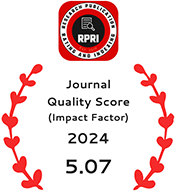Impact of Exchange Rates on Returns in Share Market: A Case of Pakistan
DOI:
https://doi.org/10.55544/jrasb.2.6.23Keywords:
ARDL, Exchange rates, SEM/Recursive Models, KSE-100 Index, Share Market ReturnsAbstract
The study focused on appraising the influence of exchange rates on returns in the share market: a case of Pakistan. Time-series data spanning 36 years (1980 to 2016) was utilized. To capture the impact of exchange rates on returns in the share market, a theory-based model consisting of six sub-models was planned and estimated through the recursive simultaneous-equations econometric estimation technique. As the data was time series, augmented Dickey-Fuller (ADF) tests were employed to assess the stationarity of the considered variables. The autoregressive distributed lag (ARDL) model was chosen due to some variables being found at different levels, such as me (0) and I (1). Bounds tests in the conclusion declared that the value of F-statistics expressed long-run associations among variables. The results revealed that share market returns were positively influenced by the exchange rate. The model also indicated that share market returns were significantly influenced by Foreign Portfolio Investment (FPI). Furthermore, National Savings (NS) demonstrated a positive and significant association with share market returns (SMR). The study's outcomes also illustrated that National Income (NI) had a positive and significant influence on SMR. The study encompassed well-expanded details and estimation techniques of various models and measures required in this type of research, especially when utilizing time-series data. Based on research findings, it was suggested that potential researchers reproduce this research to achieve a better and relatively well-conceived, well-estimated model on the topic. Additionally, it was recommended that public and private sector planners and researchers seek guidance not only on statistically significant exogenous variables but also on other explanatory variables for their effects on the endogenous variables.
Downloads
References
Alam, Q. N. (2020). Impacts of Macroeconomic Variables on the Stock Market Returns of South Asian Region. Canadian Journal of Business and Information Studies, 2(2), 24–34. https://doi.org/10.34104/cjbis.020.24034
Bhattacharya, B. M., & Mukherjee, J. (2001). Causal relationship between and exchange rate, foreign exchange reserves, value of trade balance and stock market: case study of India. Department of Economics, Jadavpur University, Kolkata, 12(2), 1–13.
Cooper, D. R., & Schindler, P. S. (2003). Business research methods. In Business (Issue 2000, p. 38). http://130.209.236.149/headocs/31businessresearch.pdf
Jamali, A., Lalzai, F., & Jamal, N. (2023). Marketing Constraints and Price Perspectives for Onion in Khost Province, Afghanistan. Journal for Research in Applied Sciences and Biotechnology, 2, 1-7.
Maheen, M. (2013). Impact of Foreign Exchange rate on stock prices. IOSR Journal of Business and Management, 7(3), 45–51. https://doi.org/10.9790/487x-0734551
Maxim, M. R., & Ashif, A. S. M. (2017). A new method of measuring stock market manipulation through structural equation modeling (SEM). Investment Management and Financial Innovations, 14(3), 54–61. https://doi.org/10.21511/imfi.14(3).2017.05
Monther, C. and Kaothar, G. (2010). Macroeconomic and institutional determinants of stock market development. The international Journal of Banking and Finance, 7 (1):130-140.
Pervaiz, J., Masih, J., & Jian-Zhou, T. (2018). Impact of Macroeconomic Variables on Karachi Stock Market Returns. International Journal of Economics and Finance, 10(2), 28. https://doi.org/10.5539/ijef.v10n2p28
Raza, T., & Fatima, S. (2016). ECONOMIC VARIABLES ON EXCHANGE RATE : A Case of some Developed and Developing Countries.
Rehman, A. (2019). Capturing Effects of Interest Rates and Exchange Rates in Pakistan’s National Economy. M.Phil Scholar, City University of Science & Information Technology Peshawar - Pakistan.
Downloads
Published
How to Cite
Issue
Section
License
Copyright (c) 2024 Sayed Ajan Ahmadzai, Mohammad Shakir Ebrahimi, Najibullah Arshad, Naeemullah Amani

This work is licensed under a Creative Commons Attribution-NonCommercial-NoDerivatives 4.0 International License.


















